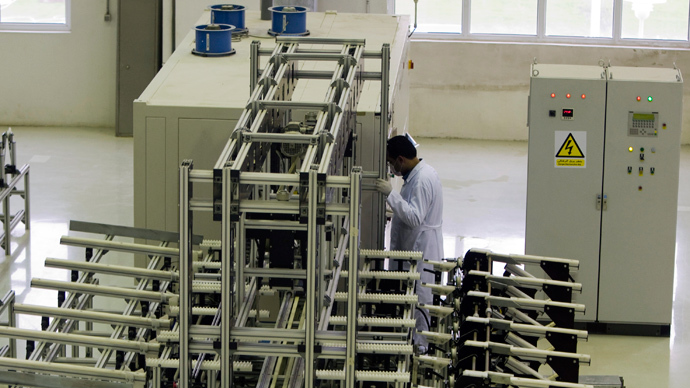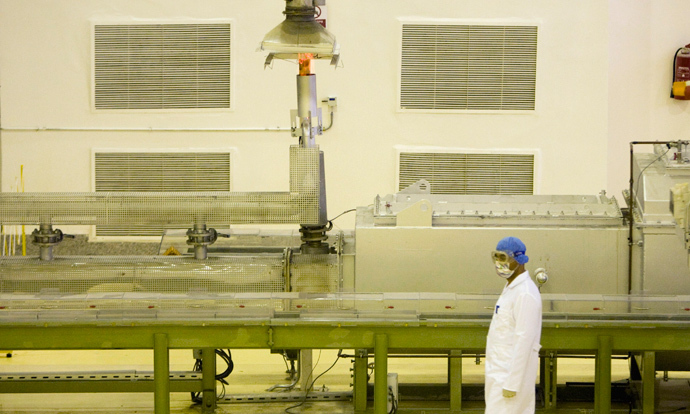Halting 20% uranium enrichment is ‘an advantage for Iran’

Iran already has more than enough 20 percent uranium for its medical needs, and producing excess material would be too costly for the Iranian economy, Professor Seyed Mohammad Marandi from the University of Tehran told RT.
RT: How is the country reacting to this historic deal, is
there only praise or is there criticism as well?
Mohammad Marandi: Obviously there is criticism, Iran is a
very diverse country, and we have many political parties and
groups but I think that the overwhelming majority of politicians
and political parties and political leaders in this country have
come out in support of the negotiations and the deal.
Ali Hosseini Khamenei, the leader of the Islamic Republic has
supported the deal, the speaker of parliament, the
parliamentarians have supported it. So I think on the whole they
see it as a very important and positive step because it basically
shows that eight years of resistance and resilience from ordinary
Iranians from the perspective of the Iranian government and state
was the right thing.
The Iranian nuclear program, which was taking baby steps eight
years ago is now a very advanced nuclear program and the western
countries within the P5+1 have been forced to accept Iran’s
continued enrichment, that is a major step forward.
The Russians have of course played a very constructive role and I
think this is within the broader improved relationship between
Iran and Russia that has been taking place over the years. And
the same is true with China, but the Western countries from the
Iranian prospective have been forced to concede a major point,
and that is nuclear enrichment.
RT:The Iranian President has just said the deal seals
Tehran's "nuclear rights" – yet John Kerry earlier
stressed that the right to uranium enrichment is not part of this
deal...Why such discrepancies?
MM: Well the US government has its own audience, its own
internal audience that it must speak to. It also has very
influential regimes, like the Israeli regime that has many
demands and they have to respond to those accusations being
leveled against the US government by the Israeli regime. So the
Americans are pursuing a particular narrative.

But the important thing is that Iran is enriching uranium today.
It is continuing to do research and improving its technological
capabilities within the framework of the NPT.
And the fact that Iran is halting uranium enrichment at 20
percent is something Iran actually wants. Because it is very
expensive and Iranians have produced fuel that it needs for the
Tehran reactor that produces medical isotopes for cancer
patients. So the Iranians have already produced enough nuclear
fuel through enriching uranium at 20 percent. It no longer needs
it. So halting that is actually an advantage for Iran, because it
does not want excess fuel, because it is very costly. So the
Iranians feel that they did not lose very much but they have a
lot to gain. And again it shows that steadfastness, at least from
the Iranian perspective and standing for your rights can achieve
results.
RT:The US seems convinced it's its sanctions policies
that have prompted Iran to signing a deal – what do you make of
such claims?
MM: I think we can reverse that argument. The decline of the
US, the American empire, the decline of Europe, the economic
crisis, the crisis of legitimacy, the fact that the US was caught
spying on its closest friends, outraging Latin America and allies
in Europe. The fact that the US invaded country after country,
the fact that it has allied itself with Saudi Arabia, and
supported the extremist in Syria, and when it wanted to attack
Syria just a few weeks ago, the American public opinion was
completely against it, despite the fact that the establishment
was for it.
This shows that the US is in much weaker position than it was in
the past and that is why the US and its Western allies were
forced to accept the reality on the ground in Iran that the
Iranians were simply will not give up enrichment for peaceful
purposes.
The fact that the Iranians have shown time after time, that there
is no evidence that the Iranian nuclear program is anything but
for peaceful purposes is something that has been ignored by the
Western media and western government. But despite all that,
Iran’s resilience has forced these countries to accept enrichment
and again the Russians and the Chinese have played a very
constructive role, over the last few months especially.
The statements, views and opinions expressed in this column are solely those of the author and do not necessarily represent those of RT.












